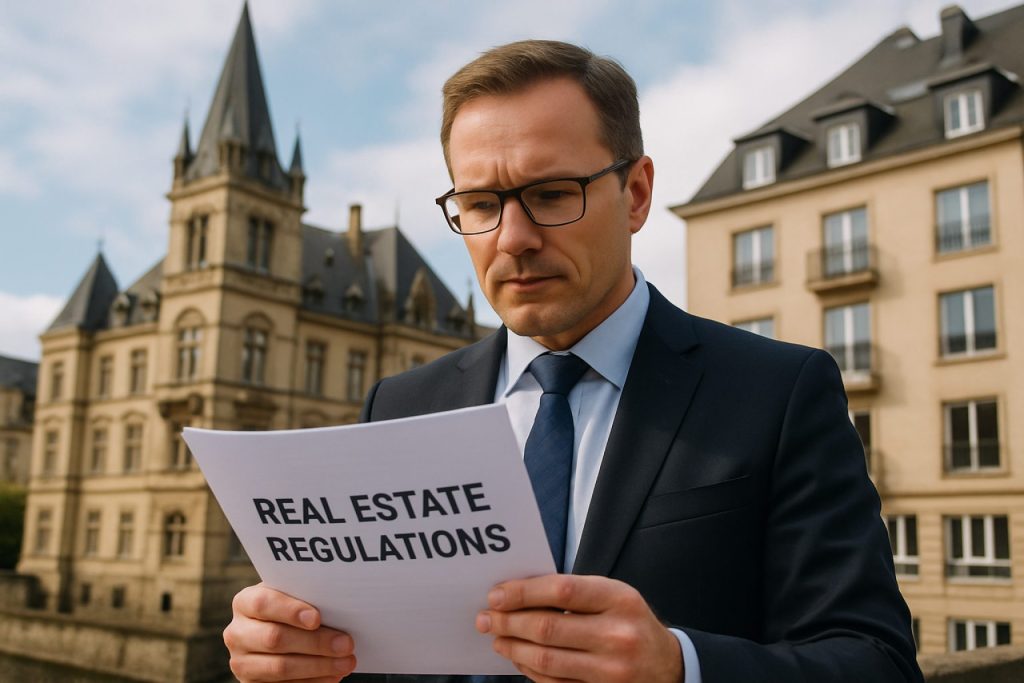
Table of Contents
- Overview of Luxembourg’s Real Estate Regulatory Framework (2025)
- Key Legal Updates and Taxation Shifts Affecting Property Owners
- Compliance Standards: New Requirements for Investors and Developers
- Zoning, Planning, and Building Permits: Recent and Upcoming Changes
- Foreign Investment Rules: Restrictions, Opportunities, and Pitfalls
- Environmental and Sustainability Regulations in Real Estate
- Landlord-Tenant Laws: Protections, Obligations, and Dispute Resolution
- Major Enforcement Trends and Penalties for Non-Compliance
- Statistical Overview: Market Performance and Regulatory Impact
- Future Outlook: Predicted Reforms and Strategic Guidance for 2025–2030
- Sources & References
Overview of Luxembourg’s Real Estate Regulatory Framework (2025)
Luxembourg’s real estate regulatory framework in 2025 continues to be shaped by a combination of domestic legislative measures and European Union directives, reflecting the country’s role as a dynamic financial center and a gateway for cross-border investment. The primary legal instruments governing real estate transactions include the Civil Code, the Law of 16 May 1975 on the Status of Co-ownership, and the Law of 21 September 2006 regulating the leasing of residential property. The Ministry of Justice oversees the legal infrastructure for property rights, registration, and ownership transfers, with all transfers of title required to be notarized and registered at the Land Registration and Estates Department.
Recent years have seen increased regulatory scrutiny, particularly in anti-money laundering (AML) and transparency measures. The implementation of the EU’s Fifth Anti-Money Laundering Directive was transposed into national law, requiring enhanced due diligence and the registration of beneficial owners for entities involved in real estate transactions. The Commission de Surveillance du Secteur Financier (CSSF) actively monitors compliance within real estate investment vehicles and funds, enforcing regular reporting and risk assessment obligations.
Urban zoning, environmental sustainability, and construction are regulated at both municipal and national levels. The Ministry of Mobility and Public Works and the Ministry of the Environment, Climate and Sustainable Development oversee planning and enforce standards for energy efficiency, with recent updates to the energy performance requirements for new buildings and major renovations entering into force in 2024 and continuing into 2025. Compliance with the General Data Protection Regulation (GDPR) also affects real estate agents and property managers handling personal data.
Key statistics from the National Institute of Statistics and Economic Studies (STATEC) indicate that real estate transactions remained robust through 2024, but growth is expected to moderate in 2025 as stricter lending criteria and affordability pressures persist. Notably, the government is considering new legislative proposals to further regulate short-term rentals and strengthen tenant protections amid rising housing demand, while ongoing tax reforms may affect property holding structures and transaction costs.
Looking ahead, the regulatory outlook for 2025 and the following years anticipates further alignment with EU sustainability initiatives and digital transformation in property registration and compliance. Market stakeholders should expect ongoing adjustments in reporting standards, increased scrutiny of cross-border transactions, and evolving requirements for environmental and social governance (ESG) compliance.
Key Legal Updates and Taxation Shifts Affecting Property Owners
Luxembourg’s real estate regulatory environment continues to evolve in 2025, reflecting both domestic priorities and EU-driven compliance. Recent years have seen a series of legislative updates and tax reforms targeting property owners, developers, and investors. These changes reflect the government’s broader aims of curbing speculation, fostering sustainable development, and improving housing affordability.
A major legislative milestone was the amendment to the “Loi modifiée du 17 février 2021,” which strengthens anti-money laundering (AML) provisions in real estate transactions. Property professionals—including notaries and agents—must now conduct enhanced due diligence, especially for higher-risk clients or transactions, in line with obligations monitored by the Commission de Surveillance du Secteur Financier. Failure to comply may result in administrative sanctions, underscoring the importance of robust compliance frameworks for all market participants.
Taxation is another area experiencing significant shifts. As of 2024, the government implemented a revised property tax regime (impôt foncier) to incentivize more productive land use and discourage speculation. The reform, detailed by the Administration des contributions directes, introduces progressive rates based on property value and location. Owners of undeveloped or vacant land in urban areas are now subject to higher rates, a move aimed at accelerating new construction and addressing housing shortages.
Additionally, the government has expanded the scope of registration (droit d’enregistrement) and transfer taxes. For residential real estate acquisitions, the basic registration duty remains at 6%, but various surcharges may apply, particularly for non-primary residences or properties held by legal entities. The “Bëllegen Akt” tax credit, designed to ease the burden on first-time buyers, has been extended through 2025, though its eligibility criteria have been tightened (Gouvernement du Grand-Duché de Luxembourg).
From a compliance perspective, the 2023 transposition of the EU’s Energy Performance of Buildings Directive (EPBD) introduced stricter energy efficiency requirements for both new and existing buildings. Owners are now required to provide updated energy performance certificates (EPCs) at sale or lease, and significant renovation works must meet higher insulation and emissions standards. The Ministère de l’Environnement, du Climat et du Développement durable oversees enforcement, with penalties for non-compliance.
Looking ahead, further regulatory tightening is expected, particularly around sustainability disclosures and rental market oversight. The government’s 2025-2027 housing action plan suggests continued focus on combating vacant properties, increasing transparency, and supporting affordable housing initiatives. Property owners should proactively monitor legal developments and ensure ongoing compliance to navigate Luxembourg’s dynamic real estate landscape.
Compliance Standards: New Requirements for Investors and Developers
Luxembourg’s real estate sector is navigating a period of intensified regulation, with 2025 marking the implementation and consolidation of several key compliance standards aimed at investors and developers. These efforts respond to both domestic policy objectives and evolving European Union directives, particularly around anti-money laundering (AML), tax transparency, and sustainable construction.
A primary focus is the transposition of the EU’s AML Directives into national law. Luxembourg has strengthened due diligence obligations for both institutional and private investors under the Law of 20 July 2023, which expanded the scope of reporting entities and enhanced beneficial ownership disclosures. Real estate agents, notaries, and developers must now verify ultimate beneficial owners (UBOs) more rigorously and report suspicious transactions to the Cellule de Renseignement Financier (CRF), Luxembourg’s financial intelligence unit.
On the sustainability front, the updated Grand Ducal Regulation on Sustainable Construction is in force, requiring new developments and major renovations to meet higher energy performance and environmental standards. From 2025, all new residential buildings must comply with stricter nearly zero-energy (NZEB) requirements, in alignment with the EU’s Energy Performance of Buildings Directive. Compliance is monitored by the Ministry of the Environment, Climate and Sustainable Development.
Tax transparency is also a central theme. Luxembourg’s authorities have fully adopted the OECD’s Common Reporting Standard (CRS) and the EU’s DAC6 regime. In 2025, enhanced exchange of tax-related information between local tax authorities and other EU member states will intensify scrutiny on property holding structures, particularly those involving cross-border investors, as outlined by the Administration des contributions directes.
- Key statistics (2024-2025): Over 37% of new real estate investments in Luxembourg have a cross-border component; 85% of new building permits issued in 2024 were subject to enhanced energy efficiency checks (STATEC).
Looking ahead, the regulatory landscape is expected to tighten further, with ongoing reviews of property tax policy and anticipated updates to digital compliance (including e-filing of real estate transactions). For investors and developers, maintaining robust internal compliance processes—particularly in AML and environmental due diligence—will be critical to securing project approvals and avoiding penalties in Luxembourg’s evolving real estate market.
Zoning, Planning, and Building Permits: Recent and Upcoming Changes
Luxembourg’s zoning, planning, and building permit frameworks are governed primarily by the Law of 19 July 2004 on municipal planning and urban development, as amended, and the Law of 10 June 1999 on classified establishments. These laws empower municipalities (“communes”) to determine local zoning plans (PAG – plans d’aménagement général) and specific development plans (PAP – plans d’aménagement particulier), which set detailed rules for land use and construction. Over the past few years, Luxembourg has undertaken significant reforms to modernize and streamline these processes, responding to rapid urbanization, sustainability imperatives, and housing shortages.
Key recent developments include the 2022 reform of the zoning regime, which provided more flexibility for mixed-use zoning and expedited approval procedures for strategic housing projects. This reform also strengthened environmental criteria and stakeholder participation requirements in the planning process. Municipalities now have enhanced obligations to integrate climate adaptation, biodiversity, and energy efficiency considerations into their PAGs and PAPs. These changes align with Luxembourg’s commitments under the national Integrated National Energy and Climate Plan (PNEC) 2021-2030, which targets climate neutrality by 2050. The Ministry of the Environment, Climate and Sustainable Development provides ongoing guidance for these integrations.
In terms of building permits, digitalization has been a recent focus. Since 2023, the “Guichet Unique” portal has allowed applicants to submit building permit requests online, track approval status, and receive notifications. This initiative aims to reduce administrative delays and improve transparency. According to the Government of the Grand Duchy of Luxembourg, average processing times for standard residential permits have fallen to approximately three months in 2024, with further reductions anticipated as digital tools mature.
Looking ahead to 2025 and beyond, further amendments are anticipated to address persistent housing shortages and sustainability targets. The Ministry of Housing has announced draft legislation to incentivize densification in urban areas and relax certain height and density restrictions, particularly for affordable and social housing projects. Additionally, integration of EU directives on energy performance in buildings will likely prompt stricter requirements for new developments and major renovations, in line with the revised Energy Performance of Buildings Directive (EPBD). The Ministry of Housing is expected to finalize these legislative updates in 2025.
- In 2024, over 2,800 building permits were issued nationwide; nearly 40% were for multi-family or mixed-use projects (STATEC).
- Luxembourg’s “SuperDrecksKëscht” program for sustainable construction waste management is being integrated as a requirement for new large-scale developments (Ministry of the Environment, Climate and Sustainable Development).
The outlook for 2025 and the coming years suggests continued regulatory tightening on sustainability, further digitalization of permitting, and ongoing reforms to enable greater residential density, all aimed at supporting Luxembourg’s ambitious climate and housing policy objectives.
Foreign Investment Rules: Restrictions, Opportunities, and Pitfalls
Luxembourg remains a highly attractive destination for foreign real estate investment, supported by a stable political environment, robust legal framework, and its position as a leading European financial center. As of 2025, Luxembourg does not impose significant restrictions on foreign ownership of real estate. Both EU and non-EU individuals and entities are generally allowed to acquire, own, and transfer property under the same conditions as Luxembourg nationals. There are no legal requirements for government approval or additional permits specifically for foreigners seeking to purchase residential or commercial real estate, aside from standard due diligence procedures applied to all buyers.
The legal process for acquiring real estate involves several steps: negotiation of the sale, signing a preliminary contract, and execution of the final deed before a notary. All real estate transactions must be notarized, and the notarial deed is then registered with the Ministry of Justice. Buyers are also subject to registration duties and transfer taxes, which, as of 2025, typically amount to 7% of the property’s value (6% registration duty plus 1% transcription tax) according to information provided by the Guichet.lu (Government of the Grand Duchy of Luxembourg).
Foreign investors should be aware of compliance obligations under Luxembourg’s anti-money laundering (AML) and counter-terrorism financing (CTF) regulations. Real estate professionals, notaries, and financial institutions are required to conduct stringent customer due diligence and report suspicious transactions, in line with EU directives as transposed into local law by the Commission de Surveillance du Secteur Financier (CSSF). This compliance environment is expected to become even more rigorous in the coming years, with ongoing alignment to evolving EU standards.
A potential pitfall for foreign investors involves urban planning and zoning laws, which are governed at the municipal level. Local authorities have discretion over land-use permissions, which can affect development timelines and project feasibility. Investors must ensure full compliance with local zoning, building permit regulations, and energy efficiency standards, which are regularly updated in response to sustainability initiatives led by the Ministry of Energy and Spatial Planning.
In summary, Luxembourg’s real estate market remains open and accessible to foreign capital, but investors should anticipate heightened compliance expectations and evolving sustainability requirements. With continued economic growth and increased demand for residential and commercial properties, the outlook through 2025 and beyond is positive, provided investors remain attentive to regulatory developments and local administrative frameworks.
Environmental and Sustainability Regulations in Real Estate
Luxembourg’s real estate sector is experiencing significant regulatory evolution, driven by the national and European Union (EU) commitments to environmental sustainability and climate goals. The government’s ambition to achieve net-zero greenhouse gas emissions by 2050, and the EU’s “Fit for 55” package, have directly impacted building standards, energy efficiency requirements, and compliance frameworks for property owners and developers.
A key regulation is the implementation of the EU Energy Performance of Buildings Directive (EPBD), which Luxembourg transposed into national law through the Law of 23 December 2022. This law imposes stricter requirements on the construction and renovation of buildings, including minimum energy performance standards, mandatory energy performance certificates (EPCs), and obligations to renovate the least energy-efficient properties. By 2025, all new buildings must be nearly zero-energy buildings (NZEB), and existing building stock faces phased renovation targets to align with national energy and climate plans (Legilux).
Environmental compliance now covers broader sustainability issues, such as resource efficiency, circular construction, and biodiversity protection. The Ministry of the Environment, Climate and Sustainable Development has mandated life-cycle assessments for major developments and incentivizes the use of sustainable materials. Environmental Impact Assessments (EIAs) are compulsory for certain projects, ensuring that both public and private developments evaluate impacts on air, water, soil, and habitats.
Recent statistics reflect the impact of these regulations: in 2023, over 80% of new residential building permits issued met NZEB standards, and EPC compliance in transactions reached 95% (STATEC Luxembourg). Non-compliance can result in administrative sanctions, including fines and, in severe cases, suspension of operations or building permits.
Looking ahead to 2025 and beyond, Luxembourg anticipates further tightening of sustainability regulations in real estate. The government is preparing additional incentives for green renovations, and large property portfolios will be increasingly scrutinized for ESG (Environmental, Social, and Governance) performance. Stakeholders should expect more rigorous reporting obligations and continued alignment with evolving EU directives. The adoption of digital building logbooks and expansion of green finance instruments will support transparency and compliance, positioning Luxembourg’s real estate market at the forefront of sustainable development in Europe (Government of the Grand Duchy of Luxembourg).
Landlord-Tenant Laws: Protections, Obligations, and Dispute Resolution
Luxembourg’s landlord-tenant laws are governed primarily by the amended Law of 21 September 2006 on residential leases, which seeks to balance tenant protections with landlord rights. In recent years, legislative and regulatory changes have focused on affordability, transparency, and dispute resolution, reflecting market pressures and the government’s ongoing housing policy reforms. The law applies to most residential leases, including furnished and unfurnished dwellings, but excludes social housing, short-term rentals, and commercial properties.
Current regulations impose strict obligations on both landlords and tenants. Landlords must provide habitable accommodation, register leases with the Administration de l’enregistrement, des domaines et de la TVA, and comply with rent control provisions for properties built before 10 September 1944. Rent increases are generally capped, and any increase must be justified and notified in writing. Security deposits cannot exceed three months’ rent. Tenants, in turn, are obligated to use the property as intended, pay rent on time, and maintain the dwelling in good condition, subject to normal wear and tear (Guichet.lu).
Dispute resolution is a notable area of focus, especially given the tight rental market and rising demand. Parties must first attempt amicable resolution; unresolved disputes are heard by the Justice of the Peace (Justice de Paix), a specialized court for tenancy matters. Recent government efforts have enhanced the accessibility of mediation and streamlined court procedures, aiming to reduce the average time for dispute resolution to under six months (Ministry of Justice).
Compliance is reinforced through mandatory lease registration and the requirement for written contracts. Failure to comply can result in administrative fines, unenforceable terms, or, in some cases, criminal liability. The government has stepped up inspections and enforcement, particularly regarding illegal rent increases and security deposit abuses (Ministry of Justice).
As of 2025, Luxembourg faces continued upward pressure on rents amid a housing shortage. Government statistics show that average monthly rents have increased by approximately 4% year-on-year, with vacancy rates remaining below 2% (STATEC). Legislative proposals under consideration for 2025–2027 include further tightening of rent controls, improved tenant protections against eviction, and incentives for landlords to renovate and offer properties for long-term lease. The outlook suggests a continued emphasis on balancing market efficiency with social equity, with greater regulatory scrutiny expected in the coming years.
Major Enforcement Trends and Penalties for Non-Compliance
In 2025, major enforcement trends in Luxembourg’s real estate sector reflect the country’s ongoing commitment to regulatory rigor, transparent market practices, and anti-money laundering (AML) compliance. The Luxembourg government and regulatory authorities, primarily the Commission de Surveillance du Secteur Financier (CSSF) and the Ministry of Justice, have intensified scrutiny of real estate transactions, focusing on both domestic and cross-border investments.
- AML and KYC Enforcement: In response to the evolving EU AML Directives, the CSSF has increased audits of real estate agents, developers, and property funds to ensure strict implementation of Know Your Customer (KYC) and Suspicious Activity Reporting (SAR) obligations. As of early 2025, several real estate firms have faced targeted inspections, with the CSSF publishing warnings and sanctions for non-compliance, including administrative fines up to €5 million or 10% of annual turnover, depending on the severity and nature of the breach (Commission de Surveillance du Secteur Financier).
- Registration and Licensing: The Guichet.lu portal highlights that all real estate professionals must be registered and licensed, with increasing checks to detect unauthorized brokerage, especially in the rapidly expanding private rental market. Unlicensed activity can result in criminal prosecution and forced cessation of business operations.
- Environmental Compliance: Stricter enforcement of energy efficiency and sustainability standards is underway, in line with the revised Ministry of the Environment, Climate and Sustainable Development guidelines. Non-compliance with mandatory energy performance certificates (EPCs) now triggers administrative penalties and can invalidate property transactions.
- Data Transparency and Reporting: The 2025 implementation of the national Beneficial Ownership Register, overseen by the Luxembourg Business Registers, has resulted in heightened enforcement against non-disclosure or inaccurate reporting of property ownership structures, with fines up to €1.25 million per infringement.
The outlook for the next few years suggests continued regulatory tightening as Luxembourg aligns with evolving EU directives and intensifies its focus on anti-corruption, market transparency, and investor protection. Real estate market participants are advised to strengthen compliance programs and remain vigilant to avoid significant financial and reputational penalties.
Statistical Overview: Market Performance and Regulatory Impact
Luxembourg’s real estate sector continues to operate within a robust regulatory framework that has evolved to address market dynamics and compliance standards. As of 2025, the sector is chiefly governed by the Law of 17 July 2020 on professional real estate activities, which reinforces licensing, anti-money laundering (AML), and consumer protection requirements for real estate professionals. The Ministry of Justice oversees the implementation of these legal provisions, ensuring agents and intermediaries comply with strict professional criteria, including registration, training, and ongoing professional development.
Recent amendments have further strengthened compliance obligations, particularly in relation to AML. Real estate agents must now conduct enhanced due diligence for both buyers and sellers, following guidance from the Commission de Surveillance du Secteur Financier (CSSF) and the Cellule de Renseignement Financier, Luxembourg’s financial intelligence unit. These measures are designed to counter illicit financial flows in a market increasingly targeted by cross-border investors.
Statistically, the regulatory environment has had a tangible impact on market performance. According to the Institut national de la statistique et des études économiques du Grand-Duché de Luxembourg (STATEC), residential property prices plateaued in late 2024, after a decade of sustained growth. Transaction volumes decreased by 8% year-on-year through Q1 2025, in part due to tighter lending criteria and rigorous due diligence requirements introduced by recent regulations. Meanwhile, new housing permits dropped by 6% in 2024, reflecting the impact of administrative procedures and stricter compliance checks.
- Residential property prices: +0.5% y/y (Q1 2025)
- Transaction volumes: -8% y/y (Q1 2025)
- New housing permits: -6% (2024)
Despite these short-term slowdowns, the regulatory environment is expected to foster greater market stability and transparency. The Ministry of Housing continues to develop digitized platforms for permitting and public access to real estate data, aiming to streamline compliance and support sustainable growth. Looking ahead, regulatory focus will likely intensify on environmental standards and green building criteria, aligning with EU directives and national sustainability objectives. Market participants should anticipate ongoing adaptations in compliance protocols and reporting requirements through 2025 and beyond.
Future Outlook: Predicted Reforms and Strategic Guidance for 2025–2030
Luxembourg’s real estate sector stands at a pivotal juncture as regulatory developments and policy reforms are poised to reshape the market landscape between 2025 and 2030. The government has recognized the need to address housing affordability, sustainable construction, and compliance with evolving European Union (EU) directives. These factors are expected to drive significant changes in both the legislative framework and strategic approaches for real estate stakeholders.
One of the most anticipated reforms is the revision of the Loi modifiée du 21 septembre 2006 regarding residential leases, which aims to enhance tenant protections while balancing landlord interests. The Ministry of Housing has signaled ongoing consultations to modernize rental regulations, focusing on transparency in rent determination, clearer definitions of tenant rights, and streamlined dispute resolution mechanisms. These reforms are expected to be enacted by 2026, reflecting Luxembourg’s commitment to social cohesion and fair access to housing (Ministère du Logement).
Environmental sustainability will also become a core compliance requirement. In line with the EU’s Green Deal and the national “Pacte Climat 2.0,” property developers and investors are preparing for stricter building energy performance standards and mandatory green certifications. The government is expected to introduce additional incentives for energy-efficient renovations and new constructions, aligning with the country’s ambition to achieve net-zero emissions by 2050 (Ministère de l'Environnement, du Climat et du Développement durable). Building permits and planning approvals are likely to incorporate more rigorous sustainability criteria as early as 2025.
From a compliance perspective, Luxembourg’s authorities are intensifying efforts to combat money laundering in the real estate sector. Enhanced due diligence obligations for property transactions, especially those involving foreign buyers or high-value assets, are expected to be implemented pursuant to evolving EU Anti-Money Laundering Directives. The Commission de Surveillance du Secteur Financier (CSSF) and the Ministère de la Justice are collaborating on stricter reporting requirements and more robust enforcement measures, emphasizing the need for real estate professionals to maintain up-to-date compliance programs.
Statistical indicators from 2024 show that housing prices remain at historically high levels, with demand outstripping supply, particularly in the affordable segment (STATEC). This market pressure is driving the government’s reform agenda. Looking toward 2030, the sector is expected to see greater regulatory convergence with EU norms, increased digitalization of transaction processes, and a shift toward more professionalized property management.
In summary, stakeholders should prioritize proactive compliance, invest in green building standards, and monitor ongoing legislative consultations. Preparing for these changes will ensure resilience and competitiveness in Luxembourg’s evolving real estate market.
Sources & References
- Ministry of Justice
- Commission de Surveillance du Secteur Financier (CSSF)
- Ministry of the Environment, Climate and Sustainable Development
- National Institute of Statistics and Economic Studies (STATEC)
- Administration des contributions directes
- Gouvernement du Grand-Duché de Luxembourg
- Law of 20 July 2023
- Government of the Grand Duchy of Luxembourg
- Ministry of Justice
- Ministry of Housing



